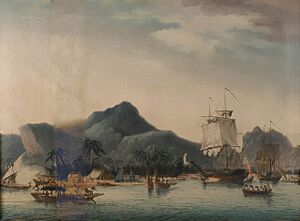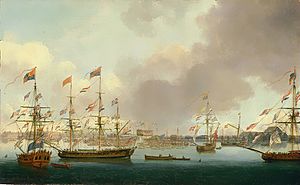John Cleveley the Younger facts for kids

John Cleveley the Younger (born December 24, 1747 – died June 25, 1786) was a talented British artist. He was especially known for his paintings of ships and the sea, which is why he is called a marine painter.
Contents
A Family of Artists
John Cleveley the Younger came from a family of artists. His father, John Cleveley the Elder, was also a marine painter. John the Younger had a twin brother named Robert Cleveley, who also became a marine painter.
- Growing Up with Ships: Both John and Robert learned their skills in busy dockyards. These were places where ships were built and repaired.
- Reaching More People: Unlike their father, John and Robert made art that could be printed and shared widely. This meant many more people could see their amazing work.
Learning and Exploring Through Art
John Cleveley the Younger trained with a famous artist named Paul Sandby. This training helped him develop his unique style.
- Journey to Far-Off Lands: John worked as a draughtsman for Joseph Banks. He joined Banks on a trip to places like the Hebrides, Orkney, and Iceland. A draughtsman is someone who makes detailed drawings.
- Sketches and Watercolours: John made many sketches during this journey. Later, he turned these sketches into beautiful watercolour paintings. Some of these artworks are now kept in the British Museum.
Painting Captain Cook's Voyages
John Cleveley the Younger became very involved with the famous voyages of Captain Cook. Even though he didn't go on these trips himself, he helped bring the discoveries to life through his art.
- From Drawings to Prints: John was hired to create engravings from drawings made during Captain Cook's second voyage (1772–1775). Engravings are prints made from a carved surface.
- Third Voyage Insights: He also got to see art from Cook's third voyage (1776–1780). This was possible because his brother, James, was a carpenter on that trip and shared drawings and stories.
- Popular South Seas Art: John quickly saw that people were very interested in images from the South Seas. He created popular prints like Death of Cook and HMS Resolution and HMS Discovery at Moorea. These prints helped people imagine these distant places.
Capturing Ships and the Sea
John the Younger painted many scenes of the Royal Dockyards. These included places like Deptford, Woolwich, and Chatham.
- Launching Ships: He often painted exciting scenes of ships being launched into the water. One example is his hand-coloured print, A view of His Majesty’s dockyard at Chatham. Another famous painting is Launch of HMS Alexander at Deptford in 1778.
- A New Style: John the Younger's paintings of ship launches were different from his father's. His father's style was more like a detailed record. John the Younger's art was more open and full of atmosphere. He often used low horizons, which made his paintings feel similar to older Dutch marine art from the 1600s.
- More Subjects: John the Younger also painted a much wider variety of subjects than his father. This showed his growing skill and interest in different aspects of marine life and exploration.
 | Audre Lorde |
 | John Berry Meachum |
 | Ferdinand Lee Barnett |


